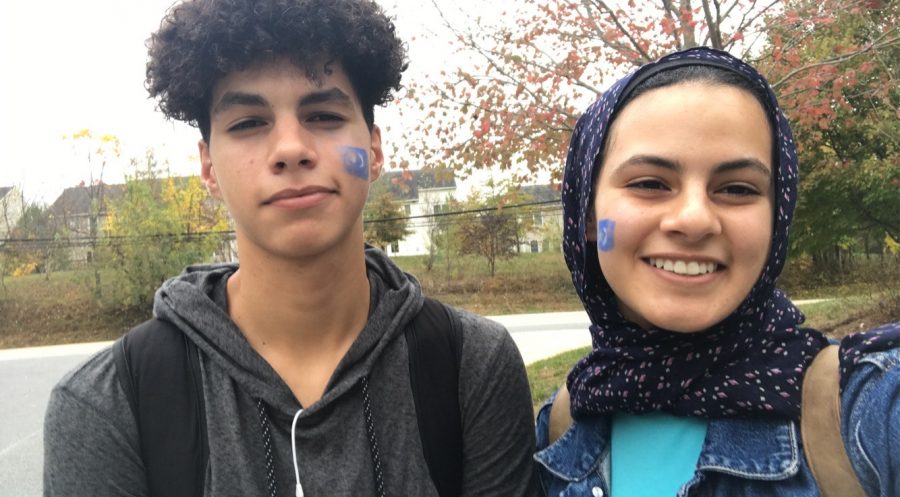Words & Photos: Mariam Abd El-Shafy
The Centennial Muslim Student Association (MSA) held an event called Uighur Awarness Day on Wednesday, October 30. The MSA asked students of Centennial to wear blue, the color of the Uighur flag, and paint the flag on their faces to encourage questions and raise awareness.
The Uighur people are a Muslim minority group in Xinjiang, northwest China. At least one million Uighurs that inhabit China have been detained by the Chinese government in what the PBS NewsHour have termed “re-education centers.” Their article shared on October 4, 2019, described how the Chinese government had been denying the existence of the centers until satellite imagery of buildings surrounded by barbed wire were found by Google map satellites. Members of the minority group who escaped claimed to be detained, interrogated, and beaten in these “re-education centers.”
In June 2019, BBC’s John Sudworth shared the extreme measures China takes in keeping the conditions of the Uighur people silent in his documentary, “Searching for Truth in China’s Uighur ‘Re-Education’ Camps.” Like the documentary, the MSA’s purpose was to educate students on the crisis in China. Farah Helal, MSA President, explains the approach the MSA took in educating the Centennial Community. “During our morning information and activity session, we made sure to separate what the government is doing from actual Chinese citizens and draw light to the Uighurs’ amazing history, cultural traditions, religious uniqueness, and current struggle underneath the government’s rule.”
A Uighur Centennial student, who, for her safety, will be referred to as Emily, also believes it is important to educate people on the subject because of the great ignorance surrounding it. “A lot of students [don’t] know what’s going on in China, ” she said. “The only thing I can do is to let more people know.”
The MSA believes the Uighur Awareness Day was a great way to educate students on the subject. “A great number of students learned about a population of the world currently struggling, allowing Muslim and Uighur students the opportunity to make a topic close to their hearts heard,” said Helal.
Emily immigrated to the United States from China three years ago. Most of her family still resides in China and is greatly impacted by the government’s actions against their people. “One day, my mom got a call from the government… and they [told] my mother, ‘your brother is in the camp.’ He’s [been] in jail for more than four years now,” Emily shares.
Sajjan M. Gohel shares in his article, “The Seven Stages of Terriorism in China,” published on The Combating Terrorism Center at West Point, that China took action against the Uighur people because of a terrorist attack on Tiananmen Square by The Turkistan Islamic Party in 2013, which left five people dead and 38 harmed. The organization’s leader, Abdullah Mansour, then threatened the government with more attacks. In 2017, this lead the Xinjiang government to pass a law prohibiting men from growing long beards and women from wearing veils. According to Gohel, Uighur citizens were then detained for their belief in Islam.
“I was so mad [at myself]; why am I a Uighur? Why have these things happened to me, and my family, and my nation,” Emily said.
Helal explains the reason behind the club’s decision in representing the Uighurs. “The Uighurs specifically caught our attention due to the increased inhumanity towards them this summer from forced labor and quartering to organ harvesting.”
22 countries of the United Nations condemned China for its treatment of the Uighurs; however, 33 applauded China’s attempt in suppressing terrorism. China’s crackdown on terrorists has stopped terror attacks for almost five years, says Gohel. But in doing so, Emily says that they have also wiped out the culture of the Uighur people.
“[The Chinese government] never taught me who I am, my history, my nation’s history… when I came to the United States I did a lot of research; my parents told me who I am and who the Uighur people are, and I was so surprised,” Emily shares.
Though there are limits to what a club can do, the MSA pushed the boundaries to speak up for an important part of the Centennial community. “Talking about sensitive issues and gaining others’ perspectives is important to understanding one another, and we believe that these awareness days are a great way to share our side of the events in the media directly with our peers and teachers,” said Helal. “We will continue our awareness days at school so the communities our diverse club-members care about get the right attention and discussion time in the Centennial community.”
th/ks/nk/pb
For more breaking news and photos, follow The Wingspan on Instagram and Twitter @CHSWingspan.

